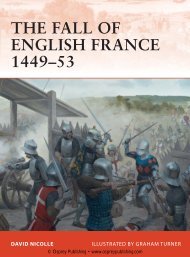Osprey - General Military - Knight - The Warrior and ... - Brego-weard
Osprey - General Military - Knight - The Warrior and ... - Brego-weard
Osprey - General Military - Knight - The Warrior and ... - Brego-weard
Create successful ePaper yourself
Turn your PDF publications into a flip-book with our unique Google optimized e-Paper software.
of Vegetius to tell him of the importance of<br />
his army having food <strong>and</strong> water, or that<br />
he should not fight a battle unless he felt he had a<br />
distinct advantage? Other material found in<br />
Vegetius was not adopted, in particular the raising,<br />
training <strong>and</strong> organization of a st<strong>and</strong>ing army of<br />
infantry - in other words, things that a medieval<br />
comm<strong>and</strong>er would need to refer to in order to<br />
learn, but for which he had little use, not having<br />
the underlying social <strong>and</strong> cultural structures<br />
necessary to implement them. <strong>The</strong> popularity of a<br />
work like Vegetius might lie as much in the fact<br />
that his was the only available classical work on<br />
the practice of war as in any usefulness. Classical<br />
writings were held in high esteem as the learning<br />
of a superior age, <strong>and</strong> knowledge of them was an<br />
indicator of erudition <strong>and</strong> intelligence. At the very<br />
least, it was felt that such didactic works, like the<br />
Speculum regale, were something that a lord or<br />
king should display amongst his possessions.<br />
<strong>The</strong> same might be suggested about the fighting manuals of the late 14th <strong>and</strong> 15th<br />
centuries. Whilst they reveal something of the methods used by the masters they are by<br />
no means works for self-instruction. <strong>The</strong> masters were careful to protect the secret<br />
techniques at the core of their system; many sections of the manuscripts are unclear or are<br />
intentionally obtuse. Lichtenauer, the earliest of the named German masters, swore his<br />
pupils to secrecy <strong>and</strong> wrote down only the most ambiguous rhyming verses, sufficient that<br />
his pupils <strong>and</strong> himself might remember it but useless to anyone who might seek to steal<br />
his system. One copy of Talhoffer's manual was bound up alongside discussions of siege<br />
engines <strong>and</strong> the making of fireworks <strong>and</strong> other matters that appear only slightly related<br />
to combat, which again suggests that these were curios rather than working textbooks.<br />
<strong>The</strong> medieval knight was not, for the most part, a low-brow illiterate thug. As we<br />
shall see, many of them were as erudite, literate <strong>and</strong> eloquent as their brothers<br />
<strong>and</strong> cousins in the Church, but theirs was a practical calling, a physical pursuit <strong>and</strong>,<br />
as such, book learning must have been of secondary importance.<br />
<strong>The</strong> knight might read Vegetius, he might train at the pell, attend tournament, <strong>and</strong><br />
be taught by the finest combat masters in Europe, but in the end it was the campaign<br />
<strong>and</strong> the battlefield that called him. Only there could he prove his mettle <strong>and</strong> fulfil<br />
his potential <strong>and</strong> his vocation.<br />
TACTICS AND TRAINING -}=>•<br />
UMnniK tt mWHAt lownxii^<br />
'JiMllfHt vCuKt' i»1 '<br />
iftnulM'Q t »tt«uv/c







